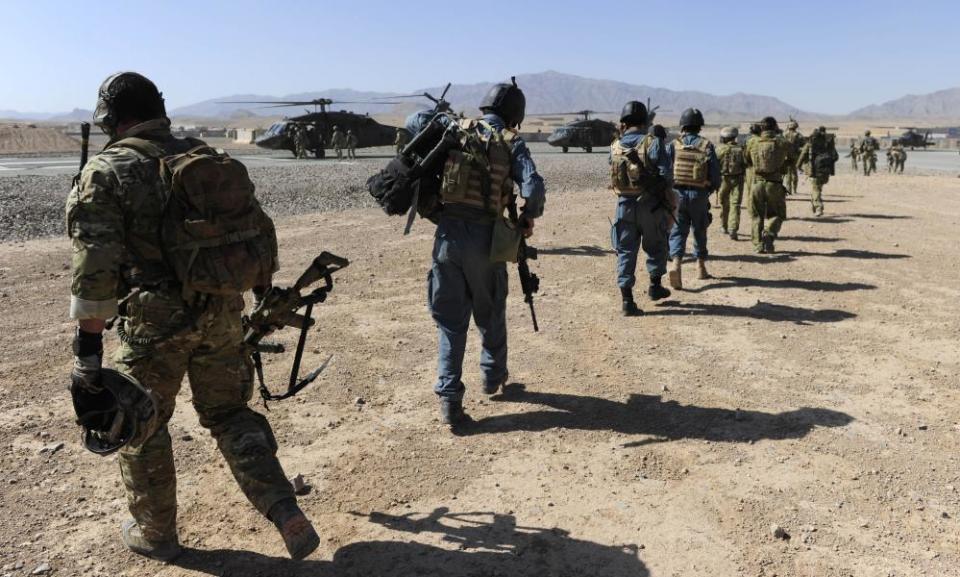Australia's entire SAS regiment must be disbanded after Brereton report, expert says

An international security specialist has argued the entire Special Air Service regiment must be disbanded after the Brereton report, saying its continued existence will drive terror-recruiting campaigns and undermine future Australian counter-insurgency efforts.
Dr Allan Orr, an expert in counter-insurgency who served as a consultant to the Coalition Counter-Insurgency Academy in Iraq during the war, says the failure to take strong steps in response to the Brereton inquiry would also risk placing Australian soldiers in heightened danger during future operations in Muslim nations, and undermine Australia’s standing at international bodies such as the United Nations.
Counter-insurgency campaigns depend heavily on establishing legitimacy and winning over local populations.
But Orr says the continued existence of the SAS – given the public allegations of dozens of unlawful killings of Afghan civilians – would make that objective extremely difficult.
Related: Kerry Stokes's position as Australian War Memorial chair 'untenable', former director says
“You’ve lost the next small war before it starts,” Orr told the Guardian. “Counter-insurgency and counter-terrorism campaigns are a case of politics divided by force. Not disbanding will see Australian forces losing the next small war before the first shot is fired and they will structurally compromise the entire political effort of the next coalition by just being there.”
Disbandment, while a radical step, has been used elsewhere. In Canada, the elite Airborne Regiment was disbanded in 1995, following the so-called “Somalia affair”, during which troops were accused of the torture and murder of a Somali teenager.
Orr is not the only expert to argue for a similar move in Australia. Christopher Elliott, a researcher with the defence studies department at King’s College London, argued in the Conversation that Australia’s special forces are “not salvageable, at least in their current structure”.
So far, the Australian government has committed to disbanding SAS’s 2 squadron and removing the meritorious unit citation from all special forces who served in Afghanistan.
Those moves were enough to prompt anger and resentment among special forces ranks, who felt as though senior command were escaping punishment and contradicting their own public statements that the majority of special forces were beyond reproach.
The defence chief, Angus Campbell, said he had considered disbanding the entire regiment after the Brereton report but decided against it.
“But we believe very strongly that the path forward for developing that regiment and Australia’s special operations capability is by committing to building and working with the people to see a better organisation emerge,” he said.
Braden Chapman, the signals intelligence officer turned whistleblower who helped expose alleged war crimes, does not think the SAS should be disbanded.
Related: It's high time to question Australia's culture of military hero-worship | Paul Daley
“[The SAS] still serve a purpose … if they move back to how they were, concentrating on their original purpose, it would be much more helpful than that direct action role that they’ve been doing for 18 years,” Chapman told the ABC.
But Orr argues disbanding 2 squadron is not only “completely disingenuous” but sends the wrong message.
“Disbanding a squadron also places blame on the enlisted ranks firmly,” he said. “Disbanding the entire regiment would be the officer corp taking responsibility also, but of course we see now rampantly that wasn’t ever an option.”
He said the failure to disband also sends a wider message to the international community.
“It pushes Australia out of the international leadership system with blatant hypocrisy (democracy as we say not as we do),” Orr said. “We may as well quit the UN because it’s clear you hold your troops to Blackwater levels of accountability and now have the same human-rights power indices as Saudi Arabia, Malaysia, Russia.
“Basically you are tier two now on the global stage. It also sends the message that the army is uncontrollable and unaccountable, determines its own justice.”
Orr says the continued existence of the SASR also risks breeding domestic terrorism “like nothing has before”.
“This shows, for those susceptible to radicalisation, proof positive that ‘white men’ have two sets of rules and that it’s OK to kill non-western peoples,” he said.

 Yahoo News
Yahoo News 